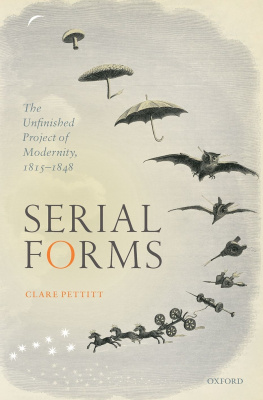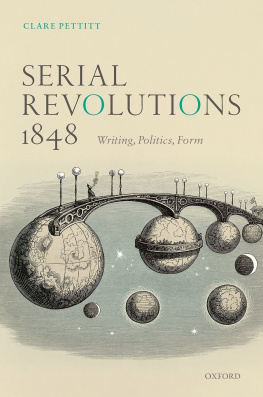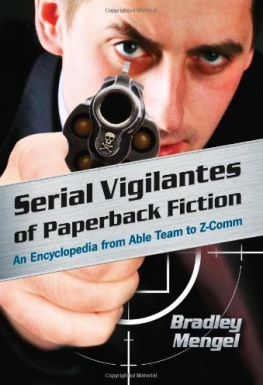Oxford University Press is a department of the University of Oxford. It furthers the Universitys objective of excellence in research, scholarship, and education by publishing worldwide. Oxford is a registered trade mark of Oxford University Press in the UK and in certain other countries
All rights reserved. No part of this publication may be reproduced, stored in a retrieval system, or transmitted, in any form or by any means, without the prior permission in writing of Oxford University Press, or as expressly permitted by law, by licence or under terms agreed with the appropriate reprographics rights organization. Enquiries concerning reproduction outside the scope of the above should be sent to the Rights Department, Oxford University Press, at the address above
You must not circulate this work in any other form and you must impose this same condition on any acquirer
Links to third party websites are provided by Oxford in good faith and for information only. Oxford disclaims any responsibility for the materials contained in any third party website referenced in this work.
Acknowledgements
Serial Forms starts in the middle of a crowd moving in different directions somewhere between the Strand and Leicester Square and a lot of my preliminary thinking for this book was done walking backwards and forwards to Covent Garden tube station on my way to and from my work at Kings College London. On the Strand (and latterly, on Kingsway), I have been intellectually sustained and challenged by extraordinary colleagues in the English Department and beyond. My dear friends, John Stokes and Mark Turner deserve my particular thanks for reading and commenting on so much of my work, often at moments which were highly inconvenient for them. Marks theories about the history of periodicals, and Johns work on nineteenth-century theatre and performance, have thoroughly informed my own thinking and their brilliance has improved this book immeasurably. Roger Parker in the Music Department was another invaluable reader who always treated this as a real project, even when I was not so sure that it was. I still stubbornly think of Josephine McDonagh as a KCL colleague although she now offers thoughts and support from Chicago. Other London colleagues have added grist and substance to my ideas, in particular Adelene Buckland, Rowan Boyson, David Edgerton, Janet Floyd, Seb Franklin, Paul Gilroy, Russell Goulbourne, James Grande, Richard Kirkland, Johanna Malt, Alan Marshall, Brian Murray, Paul Readman, Flora Willson, and Patrick Wright. The Shows of London seminar group at KCL, so called because the first text we read together in 2005 was Richard Alticks Shows of London, has offered inspiration and an invaluable space for interdisciplinary thinking. Kings is a very congenial place to work, and I am grateful for the support, not only of colleagues, but also of the institution, in the shape of departmental sabbatical leaves and a generous subvention from the Faculty of Arts and Humanities towards image reproduction costs for this book.
The impressive Jacqueline Norton at Oxford University Press has been enormously supportive. She encouraged me to develop what was beginning to feel like a hopelessly unwieldly project, and my production editor, Aimee Wright, has been a model of efficiency and good humour in helping me to navigate this book through the press. Bhavani Govindasamy was gracious and responsive in overseeing its production, and Howard Emmens, my copy editor and indexer, managed to be both precise and forgiving in equal measure and was a pleasure to work with. The two anonymous readers who read my first proposal were immensely generous, helpful, and clear-sighted in their comments. Without their intervention, the book would not have become three books and would probably never have seen the light of day at all. They remain anonymous, but I thank them wholeheartedly for everything they have done to bring this project into the world.
I would also like to thank the admirable Leverhulme Trust. The Leverhulme understands the value of slow thinking and without its commitment to the humanities, and its grown-up resistance to science-analogue models of research, intellectual life in the UK would be considerably the poorer. The three-book series of which Serial Forms is the first part has been an unconscionably long time in gestation. It began when the Leverhulme decided to fund a big interdisciplinary project at Cambridge University, where I was then Director of Studies in English Literature at Newnham College. Past versus Present: Abandoning the Past in an Age of Progress ran from 2006 to 2011 and brought together five Research Directors: myself (English); Professor Mary Beard (Classics); Professor Simon Goldhill (Classics); Professor Peter Mandler (History); and Professor Jim Secord (History and Philosophy of Science). Five years of concentrated interdisciplinary work completely transformed my view of the nineteenth century, and I hope that some of the freshness and excitement of that project has migrated into the pages of this book. My interest in the history of news grew through the writing of my second monograph, Dr. Livingstone, I Presume?: Missionaries, Journalists, Explorers, and Empire (2007), and through a second interdisciplinary research project, this time funded by the Arts and Humanities Research Council and based in London. Scrambled Messages: The Telegraphic Imaginary 18571900 was a project with Caroline Arscott (History of Art, Courtauld Institute of Art) and Mark Miodownik (Materials Science, UCL) and our conversations and discoveries over four years (201317) will underpin the third book in this series, Serial Transmission: Literature and Other Technologies, 18481918. When my directorship of the London Arts and Humanities Partnership had taken me away from research for two years, the Leverhulme Trust came to my rescue in 2018, by awarding me a years Research Fellowship. The space to read, think and write, after a decade of busy collaborative activity, has been precious beyond reckoning.
Looking back fifteen years to my first book, Patent Inventions: Intellectual Property and the Victorian Novel published in 2004, also by Oxford University Press, I realise with pleasure that many of the people that I thanked then are still very much in my life. Kate Flint, once my PhD supervisor, now my colleague and friend, has been unwavering in her belief in my work, evenand perhaps especiallywhen I have been wavering badly. Barry Windeatt, once my Undergraduate Director of Studies, is now my wise, wry, and scholarly friend; Jacqueline Tasioulas, who once ran English with me at Newnham College Cambridge, is now the steadiest of fellow-travellers through the parallel vicissitudes of motherhood and academic life. Discussing all things nineteenth-century with Caroline Arscott is always surprising and exciting. One friend and mentor in my 2004 acknowledgements is sadly missing here: Susan Manning died in 2013. I remember her often. Other friends and colleagues (the categories are pleasingly leaky) have offered invaluable support in different ways, notably Isobel Armstrong, Mary Beard, Matthew Beaumont, Fenella Cannell, Laurel Brake, Christopher Clark, Claire Connolly, Emma Dillon, Robert Douglas-Fairhurst, Eileen Gillooly, Heather Glen, Lauren Kassell, Helen Kingstone, Julia Kuehn, Mary Laven, Sharon Marcus, Mark Miodownik, Lynda Nead, Francis OGorman, David Russell, Toru Sasaki, Jan-Melissa Schramm, Helga and Charlotte Schwalm, Jason Scott-Warren, Sally Shuttleworth, Helen Small, Fumie Tamai, Sara Thornton, Adam Tooze, David Trotter, Neil Vickers, Alex Werner, and Keith White.















